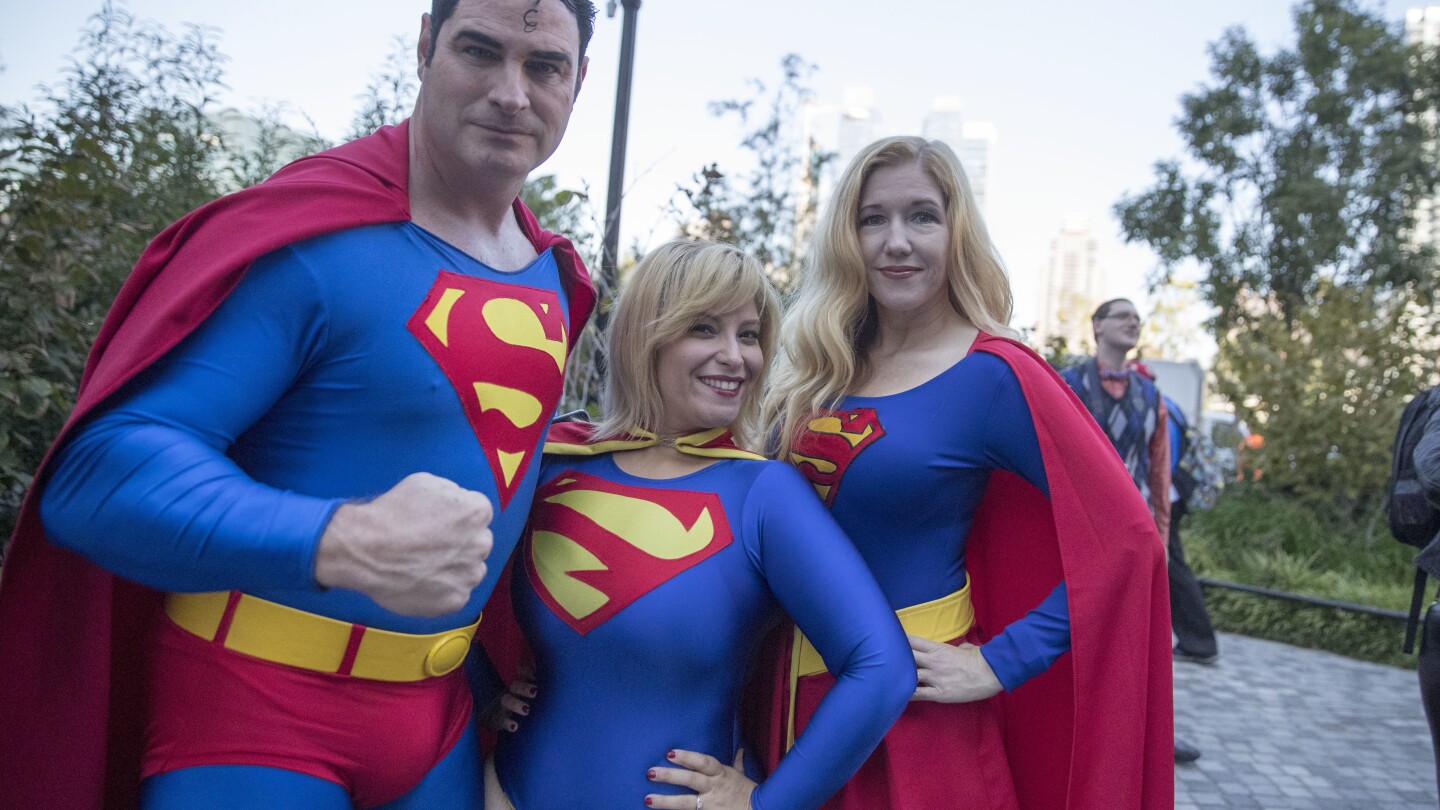Lifestyle
How to help your teenager get enough sleep — and how much they need

Navigating bedtime with a teenager is, in many homes, a nightly battle with a constant refrain: Get off your phone! Go to bed!
Research shows that today’s teenagers are more sleep-deprived than ever before. Adolescents need between eight and 10 hours of sleep, according to the Centers for Disease Control and Prevention. But nearly 80% of American teenagers aren’t getting that, and experts say it’s affecting important areas like mental health and school attendance.
Bedtime routines aren’t just for toddlers. Teenagers need them too, says Denise Pope, an expert on child development and a senior lecturer at Stanford University’s Graduate School of Education.
Experts in adolescent sleep say a few small changes to how parents and teens approach sleep can make a dramatic difference.
Try a tech-free bedtime routine for teens
The first step to setting up a better bedtime routine is dealing with technology.
— Separate children from their devices at night. Phones, tablets, streaming services and video games aren’t the only things keeping kids up at night, but experts agree they are a major factor in delaying sleep.
“Get the temptation out of the bedroom,” Pope says. If the phone is within arm’s reach, it’s hard to ignore when notifications buzz. Many teens say they fall asleep while scrolling, or reach for their phone if they have trouble sleeping, and end up scrolling for hours.
— Be prepared for excuses. “My phone is my alarm clock” is something a lot of parents hear. The solution: Buy an alarm clock.
This article is part of AP’s Be Well coverage, focusing on wellness, fitness, diet and mental health. Read more Be Well.
— Put screens away an hour before bedtime. Exposure to light prevents the release of melatonin, the hormone released by the brain that makes us feel drowsy.
Then, replace screens with a new wind-down routine.
— Try to get to bed around the same time each night and start winding down at least 30 minutes before. During that time, silence notifications, take a warm shower, read a book. To get an idea of what your teen’s bedtime should be, try an online “ bedtime calculator,” such as the one from the American Academy of Sleep Medicine.
— Avoid caffeine and energy drinks in the afternoon and evening.
— The best sleep environment is a cool, dark, quiet room. In noisy households, earplugs and a sleep mask can help. If a bedroom is too warm, it can affect getting to sleep and staying asleep, says adolescent sleep expert Kyla Wahlstrom.
Know the signs of sleep deprivation in teens
Some of the telltale evidence of sleep deprivation: being irritable, grumpy, short-tempered, emotionally fragile, unmotivated, impulsive and more likely to see the world and oneself through a negative lens. A sleep-deprived teen also may fall asleep during the daytime, in the car or in class.
“We often blame adolescents for being lazy or unruly or having bad behavior, much of which could be attributed to the fact that they are chronically sleep-deprived,” says Wendy Troxel, a clinical psychologist who has conducted numerous studies on adolescent sleep.
How do you tell the difference between a sleepy teen and a cranky-but-well-rested one?
— One key sign is what sleep expert Joanna Fong-Isariyawongse calls “zombie mornings.”
“If your teen hits snooze five times, takes forever to get out of bed, asks you for a big cup of coffee first thing in the morning, most likely they are running on empty,” says Fong-Isariyawongse, a neurologist at the University of Pittsburgh.
— Extreme mood swings are another sign. Sleep is critical for emotional processing, which is why sleep-deprived teens are more likely to be irritable, anxious or depressed.
— A sleep-deprived teen may fall behind in school, because sleep is essential for learning and memory consolidation.
— Teens who sleep less are more likely to make bad choices when it comes to drug or alcohol use, drowsy or reckless driving and risky sexual behavior.
— Does your teen sleep until lunchtime on weekends? “Most likely they are not getting enough sleep during the week,” says Fong-Isariyawongse. It’s fine to sleep in a bit, but try to limit it to a couple hours. Otherwise, it throws off the body clock and makes it harder to wake up when the new school week begins.
Why should teenagers care? Show them the science
Explain to your teens why sleep matters, and that it’s not just nagging parents who say so. The data on mental health and sleep is vast.
— Many studies show that depression, anxiety and the risk of suicidal thinking go up as sleep goes down.
— Beyond mood, sleep deprivation affects physical and athletic ability. That’s why several NFL and NBA teams have hired sleep coaches. Teens who are sleep-deprived sustain more physical injuries, because they take more risks, their judgment is impaired, and reflexes and reaction times are not as fast. Teens who get more sleep perform better in sports, and when they do get injuries, they have a quicker recovery time.
— More teenage car accidents come from drowsy driving than driving under the influence of alcohol, studies show. Teens who say they get less than eight hours of sleep a night are more likely to text while driving, not wear a seat belt, drink and drive — or get in a car with a driver who has been drinking.
As any parent knows, telling their teenager to go to sleep does not always work. You need to get their buy-in.
“Kids need to be educated about sleep, and their brain health and emotional health, and how it all ties together,” says Wahlstrom. “Tell your kids, ‘You’ll do better in school, better in sports, you’ll look better after a good night’s sleep.’ Because until they want to help themselves, they won’t do it.”
___
The Associated Press’ education coverage receives financial support from multiple private foundations. AP is solely responsible for all content. Find AP’s standards for working with philanthropies, a list of supporters and funded coverage areas at AP.org.
Lifestyle
Sweets from the sky! A helicopter marshmallow drop thrills kids in suburban Detroit

ROYAL OAK, Mich. (AP) — It’s spring in Detroit — warm weather, a few clouds, and a 100% chance of marshmallow downpours.
The source? A helicopter zooming above the green lawn of Worden Park on Friday, unloading sack-fulls of fluffy treats for hundreds of kids waiting eagerly below, some clutching colorful baskets or wearing rabbit ears.
The children cheered and pointed as the helicopter clattered by on its way to the drop zone. Volunteers in yellow vests made sure kids didn’t rush in and start grabbing marshmallows until after the deluge was complete.
For anyone worried about hygiene, don’t fret. The annual Great Marshmallow Drop isn’t about eating the marshmallows — kids could exchange them for a prize bag that included a water park pass and a kite.
The marshmallow drop has been held for over three decades in the Detroit suburb of Royal Oak, Michigan, hosted by Oakland County Parks.
One toddler, Georgia Mason, had no difficulty procuring a marshmallow at her first drop, her dad Matt said.
“Probably the most exciting part was seeing the helicopters. But once we saw the marshmallows drop, we got really excited,” Matt Mason said.
“And, yeah, we joined the melee,” he said, “We managed to get one pretty easy.”
Organizers said 15,000 marshmallows were dropped in all.
The helicopter made four passes, dropping marshmallows for kids in three age categories: 4-year-olds and younger, 5-7-year-olds, and those ages 8 to 12. A drop for kids of all ages with disabilities came later in the day.
“We do it because it’s great for community engagement,” Oakland County recreation program supervisor Melissa Nawrocki said.
“The kids love it,” she continued. “The looks on their faces as they’re picking up their marshmallow and turning in the marshmallow for prizes is great.”
Lifestyle
AP report: Superman comics have religious and moral themes

Superman comics are not overtly religious. Yet faith and morality have been baked into this superhero character who was born Kryptonian, raised Methodist and created by two young Jewish men in 1930s Cleveland.
Superman’s character has been portrayed in the mold of Christ and Moses given how he constantly upholds the ideals of self-sacrifice, powerful leadership and compassion. While scholars, comic book writers and fans alike are struck by the religious undertones in Superman comics, they all agree that what sets Superman apart is his ability to bring hope in a hopeless world.
Superman Day and the ‘Superman’ summer movie release
Friday (April 18) marks the 87th anniversary of the original superhero’s birth. It also is the date Superman made his debut in an Action Comics issue.
There is much excitement in the Superman fanverse this year because of the much-anticipated ‘Superman’ movie directed by James Gunn, starring David Corenswet, the first Jewish actor to play Superman in a major film.
On his Instagram page on April 18, 2024, Gunn shared a photo of himself, Corenswet and Rachel Brosnahan who plays Lois Lane in the upcoming film, reading among several comic books, a reproduction of Action Comics #1 — the very first one featuring the Man of Steel.
In his Instagram post, Gunn also paid tribute to the superhero, saying: “He gave us someone to believe in, not because of his great physical power, but because of his character and determination to do right no matter what.”
Gunn’s film promises a return to a version of a vulnerable Superman who is rooted in values espoused by most faiths — goodness, compassion and hope.
Superman’s Jewish roots
Samantha Baskind, professor of art history at Cleveland State University, is Jewish and sees numerous parallels between Superman’s origin story and the history of Jews.
She says Superman’s solitary flight from Krypton in a small spacecraft is reminiscent of how Moses’ mother placed him in a papyrus basket and left him on the Nile, seeing it as his best chance of survival.
Some also compare Superman’s backstory to the Kindertransport, she said, referring to a humanitarian rescue program that transported nearly 10,000 children, mostly Jewish, from Nazi-controlled territories to Great Britain in 1938 and 1939. In Superman’s Kryptonian name, Kal-El, chosen by his original Jewish creators Jerry Siegel and Joe Shuster, the “El” in Hebrew connotes God.
“There’s also the thinking that Siegel and Shuster created Superman because they were these two, skinny, young Jewish men who couldn’t go out and fight Hitler, but Superman fought Nazis on the cover of their comic books,” Baskind said.
In some early editions, Superman held Hitler by his Nazi uniform as he begged for mercy.
Strong appeal to diverse groups
Superman is relatable to diverse populations regardless of religion, race or ethnicity.
Gene Luen Yang, who has written several Superman comics, sees his own experience as a Chinese American mirrored in Superman’s story — caught between two worlds and two cultures. Yang says he had one name at home and another at school, just like Superman. So, even though he is a practicing Catholic, Yang says he relates more to Superman’s Jewish roots.
Despite the religious undertones, Superman also appeals to those who are religiously unaffiliated, said Dan Clanton, professor of religious studies at Doane University in Nebraska, adding that the superhero’s story “truly encapsulates American civil religion.”
Neal Bailey, a longtime contributor to Superman Homepage, a fan site, is an atheist. He views Superman as a “philosophical pragmatist” with the ability to solve the most complex problems with the least amount of harm.
“He actually goes beyond religion to see our commonalities,” Bailey said. “Superman wouldn’t care about people’s religious beliefs. He would care more about whether they are living up to their human potential.”
Superman inspires humans to do better
Grant Morrison, one of the best-known writers of Superman comic books, said in a 2008 interview that humans become what they imitate, which is why he made Superman an inspirational character.
Superheroes have received less-than-flattering treatment in recent films and television shows. For example, in “The Boys,” a comic book turned Amazon Prime series, the Superman-like character, Homelander, is a government-sponsored hero whose smiling exterior conceals the heart of a sadist. Gunn’s Superman is expected to change that trajectory with a superhero who will reinforce the character’s core value of preserving life at any cost.
An altruistic view of Superman can be found in the recently concluded “Superman & Lois” television series on the CW Network in which after defeating Lex Luthor in a final battle, the couple settles down in a small town and starts a foundation to help others.
“I didn’t just want to be a hero that saves people,” the Superman character played by Tyler Hoechlin says in an epilogue to the series. “I wanted to connect with them. To change their lives for the better.”
___
Associated Press religion coverage receives support through the AP’s collaboration with The Conversation US, with funding from Lilly Endowment Inc. The AP is solely responsible for this content.
Lifestyle
Fans of Superman relate to comic’s religious and ethical themes

Superman was born Kryptonian, raised Methodist and sketched into existence by two Jewish teens in 1930s Cleveland. Faith and morality are his DNA.
There are no overt religious references in Superman comics. But over eight decades, he’s been viewed as a divine entity, a savior figure — his sacrifice Christ-like, his will to lead as strong as Moses parting the Red Sea, and his compassion akin to a bodhisattva, an enlightened being who guides Buddhists on the spiritual path.
While scholars, comic book writers and fans alike are struck by the religious undertones in Superman comics, they say what separates Superman from the ever-growing pack of superheroes is his singular ability to bring hope in a hopeless world.
James Gunn’s ‘Superman’ sparks conversation
As fans celebrate Superman Day on Friday, marking the 87th anniversary of the original superhero’s birth, they are also eagerly anticipating James Gunn’s film “Superman” set for release on July 11. This version starring David Corenswet, the first Jewish actor to play Superman in a major film, promises a return to a version of a vulnerable Man of Steel who is rooted in values espoused by most faiths — goodness, compassion and hope.
The film has sparked a conversation about the place of Superman in the world and his personal code of ethics after several recent depictions of superheroes as anti-heroes. Corenswet said in a recent interview to Fandango that what captivates him about Superman is how he chooses to see good in people and not dwell on the negative.
“Why think about all the terrible things when we can focus on the good things we did today?” he said.
In the same interview, Gunn said his Superman will reinforce the character’s core value of preserving life at any cost.
“He believes that the sanctity of life is of the utmost importance,” Gunn said, noting the contrast with Superman’s archnemesis Lex Luthor, who values scientific advancement over life.
Symbol of hope and positive masculinity
It was precisely this benevolent, hopeful version of Superman that inspired Robert Revington, who teaches at the Vancouver School of Theology at the University of British Columbia, to go skydiving in a Superman costume on his 28th birthday. And yet Revington, a Christian, balks at Christ-like portrayals of his favorite superhero.
“I like Superman and I like Jesus,” he said. “I don’t necessarily want to conflate the two. To me, the best depiction of Superman is as a symbol of hope.”
Revington also sees Superman’s relevance today as “an example of positive masculinity.”
“He’s this version of strong, but compassionate masculinity, which several prominent figures don’t necessarily embody,” he said.
Revington and many others’ beloved iteration of Superman appeared in “All-Star Superman,” a 12-issue series published by DC Comics between 2005 and 2008. The superhero saves a young person who is about to take their own life with the endearing message: “You are stronger than you think you are.”
Grant Morrison, who wrote those comics, has said his view of Superman was shaped by Giovanni Pico della Mirandola’s “Oration On The Dignity of Man,” which argues that humans ought to be more virtuous than angels.
Superman speaks to our better angels
Humans, Morrison said in a 2008 interview, become what they imitate, which is why he made Superman an inspirational character.
“We live in the stories we tell ourselves,” he told Newsarama, a comic book website, and can choose to be “the astronaut or the gangster. The superhero or the super villain. The angel or the devil. It’s entirely up to us.”
As a result, said Matthew Brake, founder and editor of Pop Culture and Theology, Superman “is an idea that can inspire us to be our best selves.”
Superman’s character is also shaped by his upbringing as a Kansas farm boy, raised by kindly parents — Jonathan and Martha Kent. They are portrayed as Methodists in the comics.
Superheroes, in recent decades, have received less-than-flattering treatment. In “The Boys,” a comic book turned Amazon Prime series, the Superman-like character, Homelander, is a government-sponsored hero whose smiling exterior conceals the heart of a sadist.
“Invincible,” a comic turned television series from Robert Kincaid, author of the “Walking Dead,” features Omni-man, a Superman-like character who turns out to be an alien invader bent on conquest. The main character, Invincible, is Omni-man’s son, and must choose between protecting the Earth or taking his father’s side.
“Dune,” the famed sci-fi book adapted into blockbuster movies, warns of superheroes’ frailty
“Heroes are painful, superheroes are a catastrophe,” Dune’s author Frank Herbert once wrote. “The mistakes of superheroes involve too many of us in disaster.”
A relatable superhero
But Superman has cemented his place in pop culture not just as a beacon of hope, but also as a character relatable to many, regardless of race or ethnicity.
Gene Luen Yang, who has written several Superman comics, is best known for his 2020 graphic novel “Superman Smashes the Klan,” a story about a Chinese American family moving to Metropolis in 1946 and facing discrimination from the Klan. The story follows the Lee family as they confront the white supremacist group with Superman’s help.
Yang sees his own experience as a Chinese American mirrored in Superman’s story.
“The idea that you have to hide who you are or that you’re caught in between cultures,” he said. “Superman has two names — Kal-El, his Kryptonian name and Clark Kent, his American name. I had a Chinese name at home and an American name in school. So even though I’m a practicing Catholic, I was more drawn to his Jewish roots because that’s where I could relate more.”
Yang sees Superman as the original superhero who inspired almost religious fervor in the geekdom, featuring cosplayers who reenact scenes as a Christian might reenact biblical episodes around Christmas or Easter. A trip to a comic convention is like a pilgrimage where followers collect original art and “all kinds of relics.”
Stories in pop culture also draw from older storytelling traditions, often rooted in religions.
“In some ways, you can think of religions as communities that are built around stories that last centuries,” Yang said. “The idea of self-sacrifice, the idea that you do good deeds without the desire to gain recognition. That’s the whole point of secret identities.”
While his Catholic faith is an important facet of his life, Yang said he never forced religion into his Superman comics.
“I write more about my life and my lived experience of faith, with the doubts and the ragged edges,” he said.
Characters like Superman, while not themselves religious, provide a portal to the sacred through the profane, said A. David Lewis, a Boston-based graphic novelist and comic book writer.
“I love that people take something from popular culture and find some level of spirituality or find a greater connection to some divine source through it,” he said. “But I would never say Superman is just of the Jewish or Christian people. Like some of the best narratives out there, Superman gives us access to something transcendent.”
Superman’s strong Jewish roots
Samantha Baskind, professor of art history at Cleveland State University, is Jewish; she sees numerous parallels between Superman’s story and the history of Jews. Superman’s solitary flight from Krypton in a little spacecraft is reminiscent of how Moses’ mother placed him in a papyrus basket and left him on the Nile, seeing it has his best chance of survival.
Some also compare Superman’s backstory to the Kindertransport, she said, referring to a rescue program that transported nearly 10,000 children, mostly Jewish, from Nazi-controlled territories to Great Britain in 1938 and 1939.
In Superman’s Kryptonian name, Kal-El, chosen by his original Jewish creators Jerry Siegel and Joe Shuster, the “El” in Hebrew connotes God. In DC Comics, Superman also frequents the “Bottle City of Kandor,” a Kryptonian city shrunk down and placed in a bottle, representing a fragmented piece of Krypton’s history. Baskind said to her it is reminiscent of how diaspora Jews visit Israel.
“There’s also the thinking that Siegel and Shuster created Superman because they were these two, skinny, young Jewish men who couldn’t go out and fight Hitler, but Superman fought Nazis on the cover of their comic books,” she said. In some early editions, Superman held Hitler by his Nazi uniform as he begged for mercy.
Appeal to the religiously unaffiliated
Despite the religious undertones, Superman’s appeal to those growing religiously unaffiliated remains strong, said Dan Clanton, professor of religious studies at Doane University in Nebraska. He says it’s because Superman’s story “truly encapsulates American civil religion.”
“This idea that there are practices and beliefs that provide all, regardless of religious identity, with a sense of being part of something bigger than themselves,” he said.
Neal Bailey, a contributor for over a decade to Superman Homepage and an atheist, believes Superman at his best is a “philosophical pragmatist” solving the most complex problems with the least amount of harm.
“He actually goes beyond religion to see our commonalities,” he said. “Superman wouldn’t care about people’s religious beliefs. He would care more about whether they are living up to their human potential.”
___
Associated Press religion coverage receives support through the AP’s collaboration with The Conversation US, with funding from Lilly Endowment Inc. The AP is solely responsible for this content.
-

 Conflict Zones2 days ago
Conflict Zones2 days agoHaiti in ‘free fall’ as violence escalates, rights group warns | Armed Groups News
-

 Lifestyle2 days ago
Lifestyle2 days agoPicking a team from bars to beam and hoping for 10s: Fantasy leagues in gymnastics are a thing
-

 Sports2 days ago
Sports2 days agoJu Wenjun: Chinese grandmaster makes history by winning fifth Women’s World Chess Championship
-

 Sports2 days ago
Sports2 days agoAaron Boupendza: 28-year-old former MLS player dies after falling from 11th floor balcony in China
-

 Lifestyle2 days ago
Lifestyle2 days agoBelievers say microdosing psychedelics helps them. Scientists are trying to measure the claims
-

 Education14 hours ago
Education14 hours agoHarvard’s battle with the Trump administration is creating a thorny financial situation
-

 Middle East2 days ago
Middle East2 days agoPalestinian photographer Samar Abu Elouf wins world’s top photo prize | Gaza News
-

 Europe2 days ago
Europe2 days agoJohn Lithgow addresses concerns over ‘Harry Potter’ series casting




